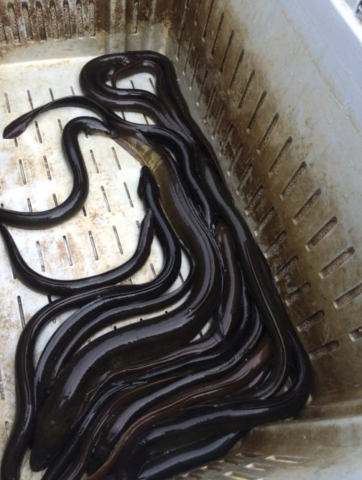BANGOR, Maine, June 5, 2024 –U.S. Department of Agriculture (USDA) Rural Development Maine State Director Rhiannon Hampson today announced a $4.3 million grant to the Passamaquoddy Tribe at Indian Township. The Tribe plans to build an aquaculture facility to farm eels as an alternative to wild harvesting. The award was one of eight across the nation made possible through Rural Development’s Indigenous Animals Harvesting and Meat Processing Grants (IAG).
Director Hampson hailed the grant as an important investment in the tribal business and a critical step for a heritage industry. “Investments such as this highlight the commitment of the Biden-Harris Administration to include Indigenous voices and values in a modernized food system,” she said. “Resilience is rooted in diversity and innovation. By supporting this partnership, we are celebrating traditional resource harvesting while recognizing that innovation helps to achieve our goals for sustainable market access.”

USDA’s IAG program supports the priorities of Tribal Nations utilizing traditional harvesting methods and indigenous animals. It also expands processing opportunities for animals that are native to North America like bison, reindeer, salmon, and American eels. The latter are valued as a traditional Native food while also being highly sought after in the global marketplace. However, hydroelectric dams in the New England region and other ecosystem challenges have severely impacted the species and resulted in sharp population declines in recent decades.
In Maine, the Passamaquoddy Tribe will use the latest technology to grow eels in a controlled environment and create value-added products such as filet and kabayaki (marinated eel), a Japanese delicacy. A partnership with American Unagi, the only land-based eel aquaculture company in the U.S., will create jobs for members of the tribe and economic opportunities for hundreds of harvesters. This partnership will help the tribe increase profits that support its programs and services and achieve full sovereignty using natural and cultural resources.

USDA Rural Development designed the Indigenous Animals Harvesting and Meat Processing Grants program (www.usda.gov/iag) to support priorities voiced by Tribal Nations during consultations held over two years. The program reflects the Biden-Harris Administration’s commitment to work in partnership with Tribal Nations to advance prosperity and dignity for all Native peoples. Grants announced today also will benefit Tribes in Alaska, Montana, Nebraska, North Carolina, Oregon, and Washington.
To strengthen Tribal sovereignty and make our overall food system more resilient, today USDA Secretary Tom Vilsack outlined a related series of agency actions. He announced grants through the Tribal Forest Protection Act and grants to support access to Indigenous foods in school meal programs. He also welcomed a class of summer interns recruited to focus on Tribal agriculture.
Speaking in Cherokee, North Carolina at the National Congress of American Indians (NCAI) 2024 Mid-Year Convention and Marketplace, the Secretary reaffirmed USDA’s commitment to Tribal self-governance and self-determination. “USDA has worked hand-in-hand with Tribal Nations to ensure our programs incorporate Indigenous knowledge and perspectives. As part of our commitment to Tribes, we are making good on our promises and investing in projects that advance food sovereignty and self-determination for Tribal Nations.”
###
USDA is an equal opportunity provider, employer, and lender.
